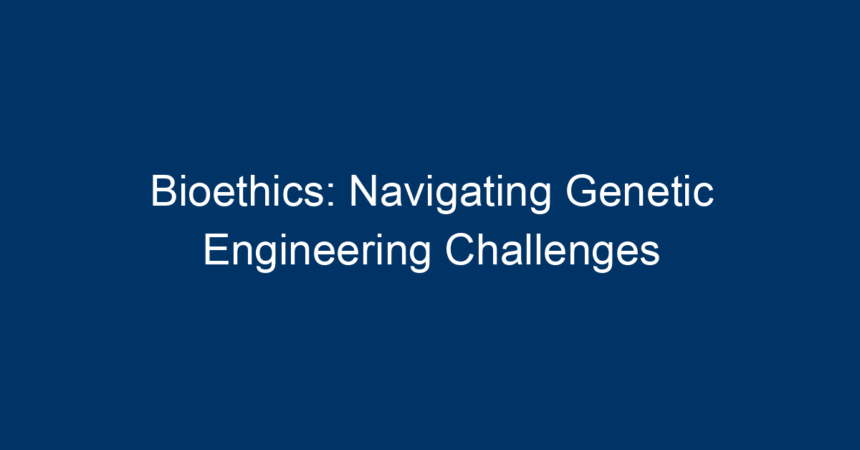Introduction: The Intersection of Ethics and Genetics
In an era where groundbreaking scientific advancements redefine our understanding of life, bioethics has emerged as a pivotal field that grapples with the moral complexities of these innovations. Among these advancements, genetic engineering stands out as both a beacon of hope and a source of significant ethical dilemmas. From CRISPR technology to gene therapy, the ability to alter the very fabric of life raises critical questions about equity, safety, and the essence of humanity itself. This article delves into the intricate landscape of bioethics surrounding genetic engineering, exploring both its promises and perils.
Understanding Genetic Engineering
Genetic engineering involves manipulating an organism’s DNA to achieve desired traits. From agriculture to medicine, the applications are vast. In agriculture, GMOs (genetically modified organisms) promise higher yields and pest resistance. In medicine, gene therapy offers potential cures for genetic disorders. However, the power to modify life forms also invites potent ethical quandaries that need navigating.
The Promise of Genetic Engineering
-
Medical Advancements: Genetic engineering makes it possible to tackle previously incurable diseases. Treatments like CAR-T cell therapy have transformed cancer care, showcasing how altering genes can produce significant health benefits.
-
Agricultural Innovation: Crops engineered for resilience against climate change and disease can address food security in an ever-populating world. This innovation could help manage the pressing challenges of hunger and malnutrition.
- Gene Therapy Potential: The future of medicine may lie in gene therapy, where faulty genes are repaired or replaced. This offers hope for millions suffering from genetic disorders.
The Perils of Genetic Engineering
While the benefits are considerable, the risks involved cannot be overlooked:
-
Unintended Consequences: Altering DNA can lead to unpredictable results. Elements of an ecosystem may shift in unforeseen ways, leading to biodiversity loss.
-
Ethical Considerations: Who gets access to these technologies, and how do we ensure fairness? The widening gap between those who can afford genetic enhancements and those who cannot raises profound questions about equity and justice.
- Playing God: Many argue that genetic engineering crosses moral boundaries, disrupting the natural order and challenging societal perceptions of life and death.
The Role of Bioethics in Genetic Engineering
Bioethics serves as a guiding framework, helping stakeholders assess and navigate the ethical implications of genetic engineering. This includes scientists, policymakers, patients, and the general public.
Key Ethical Principles
-
Autonomy: Individuals should have the right to make informed decisions about their own genetic information. This includes understanding the risks and benefits before participating in genetic therapies or trials.
-
Beneficence and Non-maleficence: Practitioners must ensure that interventions do more good than harm. This principle is particularly essential in medical applications.
-
Justice: Fair distribution of genetic technologies is crucial. Everyone, regardless of socio-economic status, should have access to these advancements.
- Informed Consent: Engaging in genetic engineering requires clear, transparent communication about what is being done and why. Participants must give informed consent based on comprehensive knowledge.
Regulatory Frameworks
Different countries have various regulatory bodies overseeing genetic engineering. In the U.S., the FDA and NIH play critical roles in ensuring that genetic technologies meet safety and efficacy standards. Internationally, agreements like the UNESCO Universal Declaration on Bioethics and Human Rights highlight the need for ethical guidelines in biotechnological research.
Current Debates in Bioethics and Genetic Engineering
Human Enhancement
The potential for genetic modification to enhance human abilities — physical strength, intelligence, even lifespan — has ignited a heated debate. Supporters argue that these enhancements could lead to an improved quality of life, while critics warn of societal implications, including inequalities and a loss of diversity.
Designer Babies
The concept of "designer babies," where parents can select traits for their children, raises ethical questions about what it means to be human. It poses concerns about eugenics, genetic diversity, and the societal pressure to conform to certain ideals of perfection.
Gene Editing in Humans
The application of CRISPR technology to edit genes in embryos has sparked significant concern. While the potential is immense, the prospect of creating genetically modified humans invites debates around safety, ethics, and what it says about our values as a society.
Environmental Ethics
The introduction of genetically modified organisms (GMOs) into ecosystems creates complex environmental concerns. How do we balance the potential benefits of GMOs with the need to protect biodiversity? Are we prepared for the long-term consequences?
Navigating Genetic Engineering Challenges: Actionable Insights
-
Educate Yourself and Others: Understanding the nuances of bioethics and genetic engineering is crucial for informed discussions. Engage with credible sources and participate in community conversations.
-
Advocate for Transparency: Support policies requiring transparency in research and genetic interventions. Inform and advocate for communities to have a say in genetic technology applications affecting them.
-
Promote Inclusivity: Encourage inclusive practices in genetic engineering, ensuring equitable access to advancements regardless of socio-economic background.
-
Engage in Ethical Discourse: Participate in conversations about the ethical implications of genetic engineering, assessing both the beneficial aspects and potential pitfalls.
-
Support Ethical Research: When considering participation in clinical trials or genetic therapies, prioritize institutions known for upholding high ethical standards.
- Stay Informed about Regulations: Follow updates on legislation and regulatory changes regarding genetic engineering. Involvement in the political process can help shape the future of bioethics and genetic research.
Conclusion: The Path Forward
As we stand on the brink of unlimited potential, the importance of bioethics in genetic engineering cannot be overstated. It serves as a crucial compass guiding us through the challenging terrain of ethical dilemmas and unintended consequences. By fostering an informed and engaged public, promoting equitable access to advances, and encouraging ethical research practices, we can harness the power of genetic engineering responsibly and with the foresight necessary for a sustainable future. The discourse surrounding bioethics in genetic engineering is ongoing, and it is our collective responsibility to navigate this intricate landscape with care, compassion, and wisdom.




